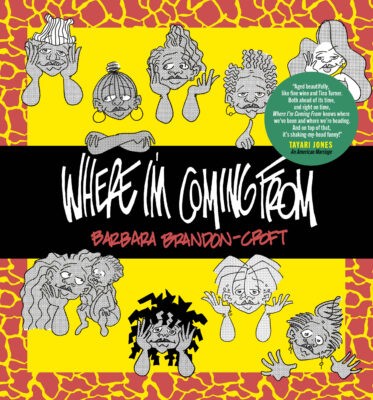Barbara Brandon-Croft’s compilation of her Where I’m Coming From comics, which ran in newspapers from 1989 to 2004, is a prime example of the calibre of book treasure I painstakingly hunt for in my free time. The book is special for a number of reasons – but personally, one of my favorite reasons is that the ideas, writings, output, thoughts, and art within it add up to something that is somehow the only one of its kind.
Brandon-Croft is actually dynastic comics royalty (her father is Brumstic Brandon, creator of ’60s-’80s newspaper strip Luther). I consider myself somewhat of a comics connoisseur, and yet, still did not know a Black woman who created her own comic existed. I found much more than I could ask for in cartoonist Brandon-Croft.
Where I’m Coming From Drawn & Quarterly
Barbara Brandon-Croft
$29.95
cloth
276pp
9781770465688
The themes and topics brought up are universal, but I am definitely in love with the biting critiques of Lekesia and Monica the most. For example, one of my favourite panels consists of Lekeesia’s thoughts about abortion. She tells us: “It’s all about timing… an unwanted fetus, born to a life of neglect, who’ll develop resentment, and hate the world… then commit a crime and be sent to prison to ultimately be executed… is the late-term abortion I’m against.’’
Everything I have just described is already so far ahead of what is portrayed in the media about Black women, up until about two seconds ago, and a large portion of this was written in the ’90s.
Another amazing tidbit included in this compilation is Brandon-Croft’s original pitch letter to syndicates. Infinite appreciation goes out to her for including this confident letter about her own craft. As a cartoonist, a woman, a Black person, to see her explaining the value of her work is invaluable. It is also (still, in 2023) such uncharted territory to see her explaining in writing the importance of her work, and pushing to get it seen. Maybe it would not have been so uncharted if more Black female cartoonists had seen or known about this letter.
You may have encountered the term “Afrofuturism,” a genre of fiction or kind of discourse (in many different forms) with imagined realities that speak to, or disrupt, our present-day ideas of what it is to be Black. Futurism can get really existential, and Afrofuturism is extremely interesting. The brutality and violence of colonialism, the taking of people, property, and territory: Black people have lived within this space forever. There isn’t really a choice but to imagine. Western/white science fiction, with its imagined apocalypses, is the reality of many people of colour.
An essay by Rebecca Wanzo that closes the collection, quotes Brandon-Croft that “A hundred years from now, if someone can look at Where I’m Coming From and say, ‘So that’s what they were going through,’ then hopefully, they’ll be able to identify with their past.” As Wanzo points out, “This collection is only thirty years into the future instead of a hundred.” I know I’m pushing it philosophically here, but to have this produced, to get this onto a page; looking at this from a ’90s perspective, I’d like to categorize Where I’m Coming From as a form of Afrofuturism. This is a representation of Black women, with all their different voices, different lives, and different worldviews, that was light years ahead of its time.mRb






Beautifully said and written !!!! You must send it to all the magazines and newspapers. It is so up to date and it deals with important issues of 2023. Congratulations and you must continue writing , because you definitely have a gift with words. I m looking forward to reading more from you in the future!